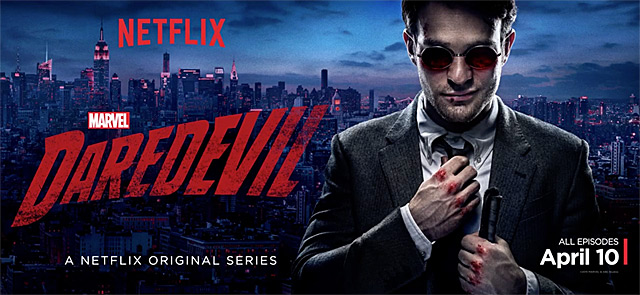I had Marvel’s Daredevil on my Netflix watch list for a long time, but for some reason didn’t pull the trigger until my wife and son were encouraged to check it out at an apologetics (defense of the Christian faith) conference held at our church recently. Now we can’t stop watching it. The series is based on the Marvel Comics’ character of the same name. Here from Wikipedia is how our hero became an almost superhero vigilante:
Daredevil’s origin story relates that while living in the Hell’s Kitchen neighborhood of New York City, Matt Murdock is blinded by a radioactive substance that falls from an oncoming vehicle while pushing a man to safety from the oncoming truck. While he no longer can see, the radioactive exposure heightens his remaining senses beyond normal human ability and gives him a “radar sense”. His father, a boxer named Jack Murdock, supports him as he grows up, though Jack is later killed by gangsters after refusing to throw a fight. After donning a yellow and dark red costume (later all dark red), Matt seeks out revenge against his father’s killers as the superhero Daredevil, fighting against his many enemies, including Bullseye and Kingpin. He also becomes a lawyer.
I say “almost superhero” because while Murdock, played by Charlie Cox, has amazing abilities because of his heightened senses, he gets the crap beat out of himself─a lot (the fight scenes are choreographed magnificently). He is also, typical of other Marvel characters, a haunted, broken human being who out of his rage at the injustice done to his father, feels he has no choice but to right wrongs. And again, as with other Marvel stories, the big questions of life are addressed, like good and evil, justice, love and hate, but unlike other Marvel stories that I’m aware of, religion and God play a central role.
In an indication that the show will take religion and the big questions of existence seriously, one of the first scenes takes place in a confesssional, with Murdock asking forgiveness, sort of, for what he’s about to do. God plays a central role, often through the lens of Catholicism, throughout the ten episodes we’ve seen so far. It makes Murdock’s struggle for justice so much more credible for me because it’s being done in the context of questions about ultimate justice. Is there even such a thing? If there is, do we just let evil flourish? Is this just the way life is in a fallen, imperfect world? Or is there something we can do about it? If the law fails, must we take justice into our own hands? Where is God in all this? If he’s there, does he even care? These are big and important questions with no easy answers, and it is enjoyable watching a show that takes them seriously.
In this Netflix version of Daredevil, Murdock starts a law firm with his best buddy from college, with the great name Foggy Nelson (Elden Henson). In their first case, pro-bono, they rescue a beautiful young woman named Karen Page (Deborah Ann Woll), who has been framed for the murder of a co-worker. She ends up joining the fledgling law firm, also pro-bono, and is a good foil for the two lawyers, one of whom brings his own brand of justice, incognito, by night. And of course, as in every graphic novel universe there is a bad man, a very bad man, played here with a menacing vulnerability by a bald Vincent D’Onofrio. The character, named Wilson Fisk, like his almost superhero nemesis, thinks he’s doing good, and while his means are pure evil, you sometimes wonder who is the bigger risk to civilization: the vigilante or the criminal. Of course we root for the former, even when we know it’s not strictly speaking, right.


